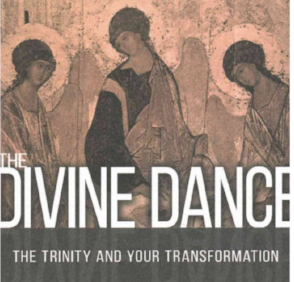It is a real joy to preach on Trinity Sunday, to remember that Jesus called us to follow Him not… define and understand Him.
Underneath the sermon audio is the basis of the preached sermon.
Trinity Church, Newport RI; Sunday June 11th (Trinity Sunday)
The Reverend Alan Neale; “No Armchair Theologians”
Such is the erudition of our Vestry that I read this at the bottom of an email this past week:
I begin to suspect that a man’s bewilderment is the measure of his wisdom.
Nathaniel Hawthorne, The House of the Seven Gables.
Well, on yet another Trinity Sunday we can be proud of our wisdom together, as we are bewildered together.
On Trinity Sunday 1992, from a small pulpit in a stone chapel, I read the following definition of Cricket.
You have two sides, one out in the field and one in, in the field. Each man that’s in the side that’s in goes out, and when he’s out he comes in and the next man goes in until he’s out. When they are all out, the side that’s out comes in and the side that’s been in goes out and tries to get those coming in, out.
Sometimes you get men still in and not out. When a man goes out to go in, the men who are out try to get him out, and when he is out he goes in and the next man in goes out and goes in.
There are two men called umpires who stay out all the time and they decide when the men who are in are out. When both sides have been in and all the men are out, and both sides have been out twice after all the men have been in, including those who are not out, that is the end of the game!
Then, as now, I saw faces amused, bemused and confused! My point then, as now, was simple – we best understand the intricacies, complexities and niceties of cricket by… playing the game. And the Trinity is best comprehended as it is experienced, (in the words of Anselm quoting Augustine) “credo ut intelligam” – I believe so that I may understand.
I love the feast of Trinity and its celebration – it honors all is vital and crucial to the Christian life.
Trinity Sunday celebrates diversity rather than dull monochrome uniformity.
Trinity Sunday redeems the concept of process and committee (and saves from despair as we remember the comment of a long-time committee member, “Well I carried nothing into this meeting and it is sure that I can nothing out!).
Trinity Sunday celebrates this glorious truth….. True Knowledge comes through experience and participation!
Sometimes, brothers and sisters in the Lord, sometimes I fear that Christians and the Church have embroiled themselves in the theological wastelands of debate in order to avoid some of the more stark and simple Gospel directives with which Jesus confronts us.
“It ain’t the parts of the Bible that I can’t understand that bother me, it is the parts that I do understand” – (Mark Twain / 1835-1910 / in The “Wit and Wisdom, of Mark Twain of Alex Ayres / 1987).
(“Go to Heaven for the climate, Hell for the company.”
“Sacred cows make the best hamburger.”
(Mark Twain / 1835-1910))
Today I share with you one of the most simple, uncomplicated, easily understood charges given to us by the One we name as Lord… FORGIVE!
The damage done by unresolved resentment and grudge, the harm done by a stark and militant unwillingness to forgive is untold.
Paul Tillich -“Forgiveness is an answer, the divine answer, to the question implied in our existence” (The New Being [New York: Scribner’s, 1955] ).
The Trinity (however difficult to define and confused to comprehend), the Trinity aches and yearns to work with us in the business of forgiveness – forgiving others, ourselves and God.
The Father is the source of – the Son the enabler – the Spirit the energy of a potent forgiveness that will set us free, make us liberated souls and, I believe, effect physical healing in our bodies as well as in our minds.
Imagine what we and the Trinity can achieve in this blessed work of forgiveness.
C.S.Lewis wrote these words: “The most important difference between Christianity and all other religions (is) that in Christianity God is not a static thing—not even a person—but a dynamic, pulsating activity, a life, almost a kind of drama. Almost, if you will not think me irreverent, a kind of dance… (The) pattern of this three-personal life is . . . the great fountain of energy and beauty spurting up at the very center of reality.”
Please, God asks you and me today, “May I have this dance?”
Oh yes, Lord. AMEN

